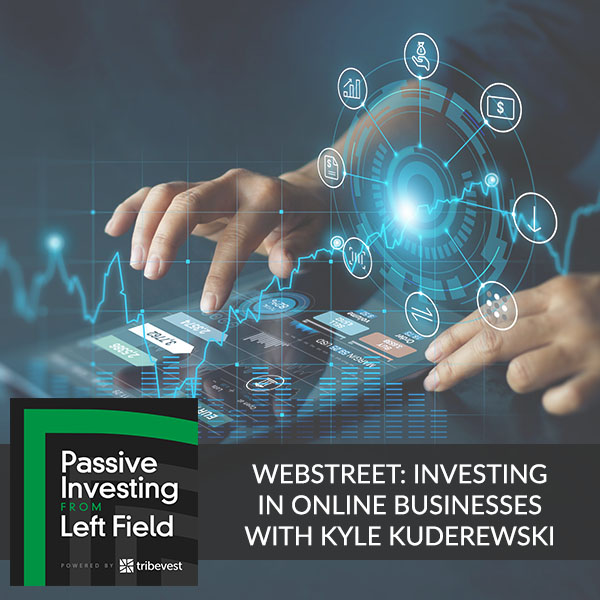
Online businesses are a great investment, but many people haven’t been able to cash in on this opportunity because they lack the time or expertise to manage an online business effectively. Through this episode, Jim Pfeifer welcomes his guest today to address that problem. Kyle Kuderewski, the Operations Manager at WebStreet, shares how investors can invest in online businesses with WebStreet. There are several monetizations or business types of online business, and one of the most popular is Amazon FBA, fulfilled by Amazon. Kyle also dives into what makes a business sell online. Tune in to this episode, and let’s ride into the digital space to sell!
Connect with Jim Pfeifer in LinkedIn.
—
Listen to the podcast here
WebStreet: Investing In Online Businesses With Kyle Kuderewski
I’m excited to have Kyle Kuderewski with us. He’s The Operation Manager at WebStreet, formerly known as Empire Flippers. They make online businesses more accessible asset classes by matching individual investors with established online business portfolio managers, enabling them to passively own successful internet businesses, including content FBA and SaaS sites. I am excited to learn more about that. Kyle is here and he’s going to explain all of it to us. Kyle, welcome to the show.
Jim, thanks for having me. I got familiar with your community and I am excited to jump into it.
Our first question is about your journey. I usually ask this question, “How did you get into real estate?” You’re not into real estate. You’re into real estate on the internet. How did you get into these online businesses? Explain your journey to get where you are now.
Real estate on the internet is a good way to put it. A little bit about me, I’m an engineer. I went to an engineering school and got into a Corporate America engineering role. I transformed from an engineer to an investor. On a personal level, I got into real estate investing as well and still do some real estate investing. Same with a lot of your community, I want to continue to get more and more passive. I learned about the high upside that online businesses and digital assets can bring. That’s how I got to learn about Empire Flippers.
I went in on that journey and became an employee there. I’ve worked for them for a few years now. I’m now the ops manager for the part of the business that does investing. We’re investing completely passively in online businesses. That was my journey. I looked into it on a personal level. I saw the huge upside. I became passionate about it and now, I’m doing it for a living.
We’ll get into the huge upside because it’s something we’re very interested in, but you changed the name from Empire Flippers to WebStreet. Can you talk about why you changed the name and if that impacts the business at all?
It’s an important thing to distinguish. Empire Flippers has been around for about a decade. It is a brokerage or a marketplace for people that want to buy or sell online businesses. Jim builds an Amazon business, a content site. He decides he wants to sell it and do something different. He would go to Empire Flippers. They would bet it, list it, sell it, and then migrate it to me or somebody that wanted to buy it. That’s still going on, but what we continued to hear for years and years was, “I don’t want to run those businesses. Can I give you guys $100,000 or $200,000 to buy a business and run it for us or run it for me?” “No, that’s not what we do.”
After hearing that enough, we decided to make it a reality. We started a sister company called Empire Flippers Capital. That was a few years ago and we can get into that journey, but Empire Flippers Capital changed its name and rebranded. We got a lot of traction now. We needed to distinguish ourselves from the brokerage side of things. We transition from Empire Flippers Capital to WebStreet. WebStreet is the investing side and Empire Flippers is the marketplace and brokerage side.
When you talk about the two different sides, WebStreet then is the passive side where I can invest in these online businesses. Can you talk about what are online businesses? Everybody is online now. I assume these are fully online businesses. What do they do? Talk about how that is structured and then we can talk about how we invest in it.
There are several different monetization or business types of online businesses. Some of the most popular ones in recent times are Amazon FBA or Fulfilled By Amazon. Those have grown enormously. Somebody develops a product, ship it into an Amazon warehouse, and Amazon handles the rest from there. You buy this gadget that’s at their warehouse. It gets shipped and that’s that. There’s Amazon Kindle Direct Publishing, where you can publish books directly through Kindle.
The big one that a lot of people don’t realize is the moneymaker or what we call content or affiliate sites. You’re getting ready to go on a big trip or you have a newborn or something like the top 10 waffle makers or top 10 travel backpacks. You go read this blog. When you click, the person that wrote that will get a commission on an affiliate for that click, whether it sends them to Amazon or to another store to purchase them from.
The same thing to the display ads if there are display ads on the site that generates revenue. SaaS, which you reference at the beginning is software as a service. A lot of the software that you subscribe to monthly, whether it’s an upgraded inbox, upgraded calendar, or a lot of these tools that you use on your computer or phone is considered software as a service. There are several others but those are the big ones.
Let’s talk about the first one, Amazon. How does this work? Do I set up a store and then sell? I just go to Amazon and buy stuff. I can tell there are certain things that are from Amazon and certain things that maybe aren’t, but I have a Prime account and they all show up the same way. How does somebody create that business? What makes it a business that is able to be sold?
In the early days of Amazon, a lot of the things that you were purchasing were more like an eBay-type store. If it’s my Amazon store, I had my own warehouse and then I’m packaging and shipping it to you and collecting the money from Amazon. Now with FBA, all I’m doing is sourcing the product and paying for the storage in Amazon’s warehouse, and they handle everything else.
It looks like it’s coming from Amazon and it is, but it’s not a product that Amazon ever owns. It’s something that the person who has the store has maybe patented or manufactured, and then they have it delivered to their warehouses. What makes a good store? It could be a lot of different things. It can be the product or the niche, depending on the time of year if it’s seasonal, and the competition. There’s a myriad of factors that can determine what makes it a good Amazon store, but those are the basics.
[bctt tweet=”With FBA, all you do is source the product and pay for the storage in Amazon’s warehouse. They handle everything else. It’s coming from Amazon, but it’s not a product that Amazon ever owns.” via=”no”]
How do you transfer ownership? What’s the thing that sets it apart? If somebody is just selling a product, why couldn’t someone else go and sell that same product and strike the same deal with Amazon? What makes this business transferable to a new owner?
Sometimes it’s patented, but more often than not, if they’re the first mover in that niche or in that type of product, they’ve already built up a bunch of reviews. They’re at the top of the page. Maybe they’ve got the advertising part of it nailed down and done a bunch of different iterations. That’s the type of thing that would make the business very attractive.
That’s what you would want to look at as a buyer as well. You want to look at the P&Ls. Are the sales increasing or declining? Are there seasonality that you want or don’t want, back-to-school type products, or Christmas? You can always throw a lot of seasonality in there and things like that. It’s a lot of due diligence that you would want to do as a buyer. That’s why we came in as an investment platform to make it passive for people. We can find the best businesses and allow you to invest in them without needing the time or expertise.

That’s right up my alley. I don’t want to use time and I don’t have any expertise. Tell me how I do this passively and how the whole thing works. There are a lot of things that I’m not sure about like vetting operators, vetting the businesses, and all that. Give us the overview. I’m a passive investor and I love real estate, but this is something different that I might want to jump in. What am I looking at?
That’s super common for us. A lot of real estate investors want to try something a little different. What we do is we have a platform through WebStreet.co. We vet the very best online business operators. We have a thorough vetting process where they apply and decide whether they make the cut or not and whether we want to raise money for them, which ties back to the Empire Flippers days. We have a huge network of people that have bought and sold with us for years. We know who the top operators are.
Once they go through a vetting process, we set them up in a fund and list them on our page. Investors can come to check out their track record, check out the acquisition strategies, check out what their growth strategies are going to be, and decide whether to invest in operator A or operator B. You do it in a completely passive fractional manner. If you think about some of these other platforms where you’re doing fractional real estates like Fundrise, YieldStreet, or some of these where you’re doing art, wine, and other fractional models. We’re doing the exact same thing for online businesses.
I need to relate everything back to real estate syndications because that’s where I spend most of my time. In a real estate syndication, I’m vetting the operator. I want to make sure I have a top-quality operator who’s going to manage the asset and make sure that everything goes to plan. That’s the main part of my analysis. I then do a little bit of analysis on the deal. I want to make sure that the actual deal the operator is putting me in is a good deal, so I know how to analyze that. Would WebStreet be like the sponsor? My first thing is I have to figure out if you guys know what you’re doing and then should I look at each company on your platform as the deal that I need to analyze? Is that a way to compare?
You want to do your due diligence on us as a company. We have a good track record to date. You can look at our returns and we can get into all that, but you’re investing in the operator or the portfolio manager. At the time that you invest, he’s going to say his goal is to raise between $1 million and $3 million to buy 2 or 3 Amazon sites. He’s going to introduce new products, his growth strategy, plus a bit of advertising. He raises the money through us.
Once that money is raised, he goes to the marketplace and purchases those businesses according to the criteria. At the time you’re investing, you don’t know, “This is Cats.com,” or whatever the exact name of the website is. You’re investing in this operator based on his track record. He then goes and purchases the websites. After he purchases them, you are informed as an investor, “These three businesses were acquired,” and then he begins to grow them.
What’s cool about these businesses is you’re not waiting on them to appreciate. They’re already cashflow positive businesses. At WebStreet, we make sure the businesses are within his acquisition criteria. We make sure they are businesses that we would believe in and that we want to back as well. We have veto power on that. Once the businesses are purchased, you get quarterly cash distributions on the profits. The profits each quarter are paid out and then at the time of the sale, the businesses as well are paid out.
What’s a portfolio manager then, just so I understand this?
It’s an operator. That’s just a term we use.
It’s somebody that operates all these businesses. Do they have specific expertise? As someone new to this, how do I vet the operator to make sure that they know what they’re doing and that they have a good track record and all of that? Do we get all that information?
You do. We have what we call the fund page or the deal page. You go and read that like, “This operator has built eight different sites in Amazon,” based on the type of sites he built, whether they’re Amazon, content, or an app. “He’s had this much success.” We do video interviews with the operator so you get to hear a half-hour interview with them, hear their expertise, and then decide whether you want to invest in them or not. Also, at this point, we’ve had several that have done a repeat. They’ve grown multiple funds with us. You can see to date that they’ve returned this much to investors year to date, and each quarter they’re returning this percentage. There are no guarantees but their track records are very open. That’s how you can make those decisions.
How would someone like me who has no experience in this go in and look at an operator? How do I vet them? As you said, I’m not going to know the actual business they’re investing in. I assume I will know the type and get some descriptions like, “This is a certain Amazon business that sells this kind of product.” They just don’t give you the name because they don’t want competition on it, I assume. Is that what’s happening?
That’s correct. As an investor, you wouldn’t want their things to be public for competition reasons. There is a bit of a trust factor there. The information we’re putting out there has all been thoroughly vetted, including background checks and the whole deal. We have different varying degrees of investors. We have some that are very interested in only a certain type of business so they might only invest in those. We have some for each round, which might have 3 or 4 different operators in it. They choose or invest in all features. They’ll split $60,000 across four different operators, and then they collect their monthly distributions and are pretty hands-off.
There are different levels of passive but for somebody that wanted to do their due diligence, you would want to dig into their track record. If they’re a repeat operator, you can see their percentages. You would want to read their deal page and get familiar with the criteria, both their past and future criteria. You want to watch the operator interview. They’re 25 to 35 minutes of the operator going through all of the details.
These portfolio managers come to you and say, “I’m looking to buy these businesses.” You provide them with the money to go buy these businesses. They go and buy them, and then operate them. Do they sell them later with a goal of turning them into permanent cashflowing businesses or is this a flipping deal?
The goal is to grow the businesses and then sell them in the 2 to 4-year range. The other thing I should have mentioned is that these portfolio managers also put 5% of their own money into the deal. They don’t get any salary, but they do put 5% of the total fund of their own cash in. They have a lot of skin in the game on a $2 million fund. It’s a significant amount of money going in, but they do sell the businesses in the 2 to 4-year range. You get the same profit split each quarter on profits and then on the exit of the business.
Does WebStreet invest as well? Do they put capital into these businesses?
We do not invest as a company. To make this as simple as possible, when you invest in the businesses as an investor, you get 2/3 of the profit every quarter and in on the sale of the business. The 1/3 is split between WebStreet and the operators. Operators get 20% on the 5% they put in, and then we get the other gap. The investors get 2/3. We and the operators get 1/3, with the operators being the majority of that.
That’s monthly cashflow plus the exit.
Yes, plus the exit.
It’s split the same for all of it.
That’s right. If the operators don’t make money, then we don’t and nobody does. It’s not like they can pay first or anything like that. Everybody wins or not.
What are some of the trends in these online businesses? As a guy jumping in this for the first time, do I want to do one of those Amazon FBA or Kindle books? How do I decide what I want to do in this space?
While we always encourage due diligence, we also encourage diversification. We don’t want somebody throwing a dart at a dart board unless it’s an educated decision and you feel strongly about it. With that being said, it has to do with time and the economy. During COVID, the Fulfilled By Amazon businesses grew like crazy. Nobody was going out and everybody was ordering through Amazon. If you feel strongly that Amazon businesses are going to continue to grow, that’s probably a good way to go.
For Kindle Direct Publishing, some people that may have knowledge of this industry, there’s a ton of upside in the Kindle marketplace and there’s a lower competition level. if you think that Amazon is getting too competitive, maybe Kindle is a good one for you. Content sites were blogs and other affiliate-type sites. Those have been around for a long time and they’re pretty stable. Their trends are not as linked to the marketplace as an Amazon site.
[bctt tweet=”Content sites are where their blogs and other affiliate-type sites are pretty stable. Their trends are not as linked to the marketplace as an Amazon site. ” via=”no”]
What are some examples of content sites?
For example, a jewelry site or anything you’re trying to go research and purchase. If you’re trying to purchase jewelry, travel gear, or kitchen appliances, these are the common ones. It’s anywhere where they’re educating you. It could be in a blog format or a top ten format. It’s helping you make a buying decision. When you click the link to go make that purchase, that’s where they get an affiliate commission.
Is that like when you google the ten best backpacks and you get to TopTenBestReviews.com? They’re trying to make money on affiliate links. Are those legitimate review sites like you’re going to get good review information? Is the number one, the one that pays the top affiliate fee and goes down from there or is it impossible to know?
There’s not a one size fits all answer there. Most of the time, they’re pretty legit or they won’t rank too highly when you google it. Some of those enormous ones like TopTenBestReviews.com and things like that. Those are going to be more geared toward your corporate payouts. A lot of these, you can tell, are a bit more personal. They’ve tried the gear out. You can often tell by the way they’re writing the review. If they’re getting into the details and they know what they’re talking about, it’s a higher likelihood that they’re legitimate. It’s depending on where they’re sending you. They could send you to Walmart.com to purchase something that’s probably not the top ten backpack, but if they send you to a better outdoorsy type site. Chances are it’s more legit.
How much do those companies pay? You probably can’t give an exact number but a ballpark. If I go onto a backpacking website, and they have a list of ten backpacks and it sends me to REI, Amazon, Walmart, and Backcountry.com, what kind of money are they making? Is it for each time someone clicks and goes to the site or is it each time someone clicks goes to the site and buys something? How much are those fees?
Generally speaking, it can be either or both. Usually, they have a model where they get paid for the click and cookies the person that clicked it, and then if they purchase, they will get an additional commission. Sometimes that’s not the case. Sometimes it’s just for the click. The larger the site they’re sending you to the smaller the commission. If it’s a Walmart or REI, they’re not going to pay a ton for each click because they don’t necessarily need your business. If it’s a small niche jewelry site or something like that, it varies widely but it’s quite a small percentage. The articles need to be well-written. They need to be generating a lot of clicks for these sites to do well.

We’re an affiliate for Amazon on some of the books that we recommend. We make like $12 a month. Maybe we made $80 last year on it, but you might as well. I was curious about that. How do you find these operators or portfolio managers? Do you find the businesses first and then find who’s operating them or do you find the operator? How do you do all that?
This goes back to starting out as a sister company at Empire Flippers because Empire Flippers is such a big player in the online business space and brokerage space. They’ve sold over $400 million in online businesses, over 70 sites that were worth $1 million plus. A lot of those online business operators are a part of the community. They’ve been either buyers or sellers. They go to these conferences. They’re in our industry. We have a good sense of that.
We’re a big part of several online business communities. We’re always asking people to apply, but we have a thorough vetting process. It starts out with a simple application. We then have them go do fake due diligence where they go to the marketplace and find a business you would buy. If you were an operator, bring it back to us and tell us why you like that site, and what would you do to grow it. We have 14 funds so 14 operators so far. There have been 800-plus applicants or something like that. It’s quite selective as it should be, but that’s where we find them.
The businesses, when we first started out, they were only buying from the Empire Flippers marketplace, which we knew was quality because of the vetting and the team that was in place there at EF. At this point, we’ve grown to where they are able to purchase from other brokerages and do off-market deals, which was always the plan. We know that you need more deal flow than just one brokerage. That’s where they’re finding the businesses.
Give me an average basic example. Let’s say we buy one fulfilled by Amazon. How much does it cost to buy it for the operator and thus for us investors? What’s the average typical monthly cashflow? This is ballparking and you can’t tell me the exact. At exit, what’s it worth? If we buy it for $100,000, are we selling it for $1 million? Give the averages or basics to understand a little bit about the dollars we’re talking about.
I can think of one of our portfolio managers offhand who raised about $2.3 million and bought two Amazon businesses that were each around $800,000, so $1.6 million. That leftover capital was returned to investors. It’s worth noting so we’re never trying to force them to spend the money. If they don’t find a deal or they don’t like that, the extra capital is returned to investors.
That’s two businesses at around $800,000 each. That particular fund is a few years old. Our round-one investors received 14.6% returns last year. That means the businesses are growing. Those are quarterly profits. A year or two from now when he goes to sell the business, will it continue to grow? Will it have slowed with the economy, or whatever the case is? It is pretty hard to predict. We’re seeing these $800,000 businesses might grow by 20% or 30% over the course of 2 or 3 years or something like that. It varies case by case. I’d love to give concrete numbers.
I get that. It’s hard to figure this out. This isn’t necessarily a bad thing. I want to understand what we’re doing here. I’m going to go into WebStreet and I’m going to look at a bunch of different portfolio managers. I’m going to pick Steve. He’s going to be my portfolio manager. I will know that he’s probably going after Fulfilled By Amazon stuff, but I won’t know exactly what. I’m going to give him money and trust that he knows what he’s doing. I’m going to end up buying businesses that I don’t know ahead of time. That’s fine as long as we know what that model is.
The thing that we’re investing in is we’re investing in WebStreet trusting that they’re going to screen operators or portfolio managers effectively. Once we go in there, they’re all pre-screen. Now, we’re going to go in and pick the one we think is going to be the most successful. That person is going to go and invest in stuff that we’re not going to know until after the deal is done. Is that accurate?
Generally speaking, it is. To be clear, we’re the fund managers, so we hold the funds. The operator doesn’t have any access to the funds. Once he decides, “I want to buy business A,” he brings it to us. We say yes or no, “You should negotiate it this way.” We then would pay the buyer and make sure it’s migrated. From an investor standpoint, everything you said is correct but we’re doing all the fund admin so you’re not giving this operator money.
Part of this is getting people like me comfortable because I’m used to investing in a single deal where I have a proforma and know exactly what they’re going to do, or a fund that has an idea or a history. This is similar to a fund, but it’s a little bit more of a black box than a fund. It isn’t necessarily a bad thing because if you gave me all the financials and told me everything about this business, I wouldn’t know whether I should buy it or not anyway.
I want to be clear that we are relying on WebStreet first, and then the portfolio manager second. Talking about passive, we’re blindly trusting those two entities after we’ve done our due diligence on those two. I’m not trying to paint this in a negative light. I want everyone to understand that this is what it is. You either have to be okay with that or you go somewhere else.

That’s right. Fund is a good way to think of it. We call them funds. Each one is a fund. These operators are portfolio managers. The other thing you’ll learn as you do their due diligence is what their team looks like. Some of them have their own warehouses. Some of them have a team of writers that crank out these affiliate pages we’re talking about. They all have a team supporting them.
The other part is WebStreet and this community of business operators support each other. We do quarterly masterminds. “I’m struggling with this. What about this Google update? What about this shipping issue?” We have several cases where they’ve worked together to overcome things. There are pluses and minuses to the model, but you’re describing it correctly.
Can you talk about the minimums and how this is taxed?
The minimums vary per round. Generally, they’re around $20,000 per fund with some incentive to diversify across them. As of March 2023, we have a round of deals open. It’s got four funds in it. You could do a $60,000 investment which will be split evenly between those four funds, or you could pick any individual one at a minimum of $25,000. In that range, we’re close to a crowdfunding-type model that we’re going to test through as well for smaller amounts in a little bit lesser term. As of now, that’s where we’re at. From a tax perspective, you get a K-1 each year as a partner in the LC and the fund. It’s a fifteen-year straight-line depreciation. You get your tax on the distributions each quarter throughout the year.
How is it taxed? You’re not a tax advisor, so we’ll put the caveat that this is not tax advice, but I’m surprised that there’s depreciation. Maybe they’re owning buildings and warehouses and things like that, but through the K-1, are any depreciation benefits passed to the investors?
It is depreciated as if it was a hard asset. It’s a business that is depreciated on a fifteen-year straight line.
There would be tax benefits. We’re used to real estate where you get these heavy tax benefits in year one. We wouldn’t get that big of a tax benefit, but it seems to me that probably in year one, you’d have enough tax benefit to offset maybe the cashflow from year one.
That’s correct. Depending on if their distributions are enormous and it explodes quickly, it’s going to be less. In year one, there’s not much of a tax burden because of the depreciation and smaller distributions at the beginning.
That’s great. How would you compare this to real estate? You said you’re also a real estate investor. Is this something I should allocate 100% of my capital to, or should I dump a little bit in and keep doing my real estate? Are they related? Is one better than the other? Are they non-correlated? How would you put those two together?
You want to continue to diversify. I don’t recommend doing 100% in this, but a lot of people for many years didn’t have this option. They’re doing 100% in real estate and as you hit on there are huge tax benefits, especially if you’re owning your own or whether you’re doing it passively or with funds. I would encourage people to get educated on it. A lot of people don’t realize that this is even an option.
When they start to dig in, learn more, and look at the numbers behind how big the eCommerce industry and Amazon as a whole if anybody thinks it’s going anywhere, I would find that surprising. Why not get some exposure to it in a completely passive way? The other thing I would encourage people is you can do a smaller amount compared to real estate upfront and see what they think about the process. A lot of people like learning about the sites they’re involved in, watching them grow, and seeing the strategies the operators have.
Along with those quarterly distributions I was talking about, the operators give quarterly reports where they say, “This worked and this didn’t.” It depends on what each person’s interests are. A lot of people like that part of it. It’s not 100% of anybody’s allocations, but it’s a nice way to do something other than real estate or other than stocks. That is relatively uncorrelated. In 2022, our returns were 15% cash distributions in a year where everybody knows the markets were not so hot.
If I buy into one of these, I will eventually know what the name of the business is. If I wanted to buy something from them, I could be supporting myself.
That’s correct. You can tell your friends about it at dinner parties. I sent out an acquisition update to some previous investors because we completed another acquisition. You do learn the names, which is fun.
That’s great. I don’t know if you’re a podcast listener or not, but the last question I usually ask is, what’s a great podcast that you like to listen to?
I like a lot of them. I stay away from the big ones. For those that are interested in online businesses and investing, this isn’t ours. It’s called the Opportunity Podcast. It is an interesting fun spin on things. On the real estate side of things that line up exactly with what your audience does, there’s one called Ice Cream with Investors, which is all about passive real estate investing like self-storage. It lines up with a lot of your audience’s interests.
Those are two new ones for me which are always great because I listened to a ton of podcasts. Finally, if people want to get in touch with you and learn more about WebStreet or this business model, what’s the best way to get in touch with you?
It’s WebStreet.co is our main page. My email is [email protected]. I respond and read every email. We’re on all the socials as well which is WebStreet. I appreciate everybody and I appreciate you having me on.
This was fascinating. We appreciate you being here. We’ll check out those links and do a little more research on this because this is something different than real estate, but something super exciting. Thanks, Kyle, for being on the show.
Thanks, Jim.
—
That was certainly not your typical real estate syndication episode. It’s nice to have these different types of episodes every once in a while to give you something else to look at. This is an interesting asset class for me. I liked how Kyle started out. He was a real estate investor and wanted something more passive. He didn’t find syndications right away as I did. Instead, he went and found these online businesses, which are interesting. It’s something that all of us use. I don’t know that many of us think about, “How could I own that business?” If I think of that, I certainly don’t want to operate the business. I prefer to be an owner and have someone else manage my assets. That’s what these portfolio managers do, which are the operators.
I liked how he explained everything, so I understand it a little bit better. There are different versions. You can invest in the fund, which sounds like that’s what you’d want to do right out of the gates, and have 3 or 4 portfolio managers and invest in all of them. Once you get some expertise and get to know the individual portfolio managers, maybe that’s when you go in with one instead of the fund.
It’s like added value. The asset managers are going to grow the asset, manage the asset, and then sell it in 2 to 4 years. It’s similar to what we do with some of the multifamily deals that we look at. I try to relate everything to real estate because that’s what I spend most of my time doing, but this has a lot of parallels in there.
I liked it at the end when Kyle said, “You need to get educated and diversify.” Sometimes on these podcasts, they have people that are on there that are marketing and selling pretty hard. They don’t say, “Go get educated first.” They say, “Invest with us. We’ll show you how to do it.” I like that he’s focusing on education. He also said, “You don’t want to put all of your assets into this type of investment.” He was kind enough to acknowledge that diversification is a good idea. I like it when people are transparent that they are looking out at least partially or hopefully a lot for the best interest of their investors. Kyle is on that.
This is something I’m going to look into a little bit. There are a lot of parallels to real estate. There’s some pretty good cashflow and good upside on this. It’s worth dipping a toe in and seeing what it’s like. Perhaps we’ll get Kyle on for lunch and learn and share that knowledge with the whole community. That’s it for this time. We’ll catch you next time in the left field.
Important Links
- WebStreet
- Empire Flippers
- TopTenBestReviews.com
- Walmart.com
- Backcountry.com
- Opportunity Podcast
- Ice Cream with Investors
- [email protected]
- Investor Interest Form
- Two-Year Performance Review – WebStreet
About Kyle Kuderewski
 Kyle Kuderewski is the Operations Manager at WebStreet, which makes online businesses a more accessible asset class by matching individual investors with established online business Portfolio Managers, enabling them to passively own successful internet businesses, including content, FBA, and SaaS sites.
Kyle Kuderewski is the Operations Manager at WebStreet, which makes online businesses a more accessible asset class by matching individual investors with established online business Portfolio Managers, enabling them to passively own successful internet businesses, including content, FBA, and SaaS sites.
WebStreet is the world’s leading marketplace for buying and selling established and profitable online businesses, with 245K+ users and $400M+ worth of deals done. To date, WebStreet has raised $22M+ across four rounds of fundraising, which they have invested in 30+ online businesses. Their online business Portfolio Managers offered investors 15% cash-on-cash returns in their first full year of operation (they launched in 2021).
Online businesses are a great investment, but many people haven’t been able to cash in on this opportunity because they lack the time or expertise needed to effectively manage an online business. WebStreet addresses this problem by turning what has traditionally been an actively managed asset into a completely passive opportunity for investors. In the hands of the right operating partner, online businesses can provide strong and non-correlated returns compared to other investment opportunities.
Before joining WebStreet, Kyle spent almost ten years as a Engineering Manager at Georgia Pacific, where he oversaw a team of engineers managing significant capital projects. He holds a master’s degree in project management. He is also an outdoor enthusiast who spent a summer cycling across America to raise money for people with disabilities, and an entrepreneur who successfully manages a vacation rental business in a small US beach town.
Our sponsor, Tribevest provides the easiest way to form, fund, and manage your Investor Tribe with people you know, like, and trust. Tribevest is the Investor Tribe management platform of choice for Jim Pfeifer and the Left Field Investors’ Community.
Tribevest is a strategic partner and sponsor of Passive Investing from Left Field.








